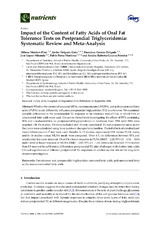Impact of the Content of Fatty Acids of Oral Fat Tolerance Tests on Postprandial Triglyceridemia: Systematic Review and Meta-Analysis
Autor
Monfort-Pires, Milena
Delgado-Lista, Javier
Gómez Delgado, Francisco
López-Miranda, José
Pérez-Martínez, Pablo
Gouvea Ferreira, Sandra Roberta
Editor
MDPIFecha
2016Materia
Fat tolerance testPostprandial triglycerides
Saturated fatty acids
Polyunsaturated fatty acids
Monounsaturated fatty acids
METS:
Mostrar el registro METSPREMIS:
Mostrar el registro PREMISMetadatos
Mostrar el registro completo del ítemResumen
Whether the content of saturated (SFA), monounsaturated (MUFA), and polyunsaturated fatty acids (PUFA) could differently influence postprandial triglycerides (TG) is unknown. We examined possible differences in the postprandial TG response to fat tolerance tests (FTTs), in which SFA or unsaturated fatty acids were used. Crossover clinical trials investigating the effects of FTTs containing SFA and unsaturated fats on postprandial triglyceridemia in databases from 1994 until 2016 were searched. Of 356 studies, 338 were excluded and 18 were considered. TG net incremental areas under the curve were calculated using time-points or changes from baseline. Pooled effects of standardized mean differences and I2 test were used. Results: In 12 studies, responses to SFA versus PUFA meals, and in 16 studies versus MUFA meals were compared. Over 4 hours, no differences between SFA and unsaturated fats were observed. Over 8 hours a lower response to PUFA (SMD −2.28; 95%CI −4.16, −0.41) and a trend to lower response to MUFA (SMD −0.89, 95%CI −1.82, 0.04) were detected. FTTs shorter than 8 hours may not be sufficient to differentiate postprandial TG after challenges with distinct fatty acids. Clinical significance of different postprandial TG responses on cardiovascular risk in the long-term deserves investigation.

